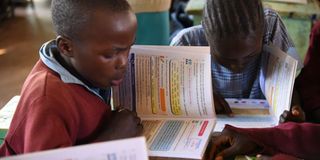300,000 may drop out as private institutions risk closure

What you need to know:
- Already, the majority of Kenya’s 11,000 private learning centres are reeling under the coronavirus sting.
- Many are unable to pay workers and foot bills.
- Some have shut down after being evicted from their rental premises
More than 300,000 learners are likely to miss classes when the academic year begins as private schools hard-hit by the Covid-19 pandemic may remain permanently shut.
Already, the majority of Kenya’s 11,000 private learning centres are reeling under the coronavirus sting, with many unable to pay workers and foot bills.
Kenya Private Schools Association (KPSA) Wednesday said more than 1,000 learning institutions may not be in a position to take back their pupils and students next year.
EVICTED
Some have shut down after being evicted from their rental premises while others have lost employees as they could not keep them on payroll.
“We have reports of about 109 schools that will not be back in business,” KPSA chairman Peter Ndoro told the Nation.
“They have folded up. Having no income for months is difficult.”
The closure of the institutions is likely to add to the headache of parents, who already are grappling with keeping children at home after President Uhuru Kenyatta ordered schools closed in March.
STAFF JOBLESS
Private schools employ hundreds of thousands of teaching and subordinate staff, now rendered jobless, KPSA vice chairman Isaiah Mbaabu said.
“Teachers have deserted us since there is no money,” the director of Highlands Academy in Timau, Meru County, said.
“We have not paid them for months and out cash taps have run dry.”
Mr Mbaabu added that an estimated 200 schools with more than 50,000 children in Upper Eastern are likely to permanently close.
“We are talking of more than 300,000 who will be out of private schools next year. They must be absorbed by public schools which lack teachers and viral facilities,” he said.
“Even as the government focuses on public schools, the role of private institutions cannot be ignored.”
NORTH RIFT SCHOOLS
Kenya National Union of Private and BOM (Board of Management) Teachers, Uasin Gishu chapter chairman Obed Nyakundi said more than half of the 400 private schools in the North Rift may not reopen.
“The schools naturally depend on parents to pay bills, teachers and rent,” Mr Nyakundi said.
“Parents have not paid anything for months.”
Mr Rodrick Marando, another union official, said schools are in dire financial straits, adding that their assets could be seized and auctioned for defaulting on loans.
“Some teachers have resorted to casual jobs. The fate of the institutions hangs in balance unless the government comes to their rescue,” Mr Marando said.
Seventy four private schools in West Pokot are likely to remain shut, County Education chief Jacob Onyiengo said.
FIRST TERM FEES
He added that some parents had not cleared first term fees, “and this has made the already bad situation worse”.
Some schools in Nyandarua County have had their electricity and water disconnected due to accrued bills.
School directors and heads appealed to the President to consider giving teachers half pay.
“Our teachers and their families are miserable. They deserve the support like any other suffering Kenyan,” Hezta Academy owner Tabitha Wangari said, adding that the institution requires Sh500,000 for teachers’ salary every month.
Private school teachers yesterday asked the two levels of government to list them as a vulnerable group.
The government in May approved a Sh40 billion kitty to cushion needy households from economic shocks of the pandemic.
STATE BAILOUT
Mr Mbaabu criticised Kenya National Union of Teachers Secretary-General Wilson Sossion for opposing State bailout of private schools.
“The people we employ are registered by the Teachers Service Commission. It is unfortunate to hear the government being advised to ignore an important part of the society during a crisis,” he said.
Last month, Mr Sossion said the government has no contract with business-oriented learning institutions.
“The proposal by private schools that the State provides grants to enable them pay staff is out of tune,” Mr Sossion said.
He added that it would be a violation of government policy to provide children free education if funds are used on private entities.
“Investors should seek alternative funding from banks and other financial institutions to keep their enterprises afloat,” the Knut boss added.
Additional reporting by Stella Cherono, Barnabas Bii, Stanley Kimuge, Oscar Kaikai, Florah Koech, Waikwa Maina, Francis Mureithi, John Njoroge and George Sayagie.





